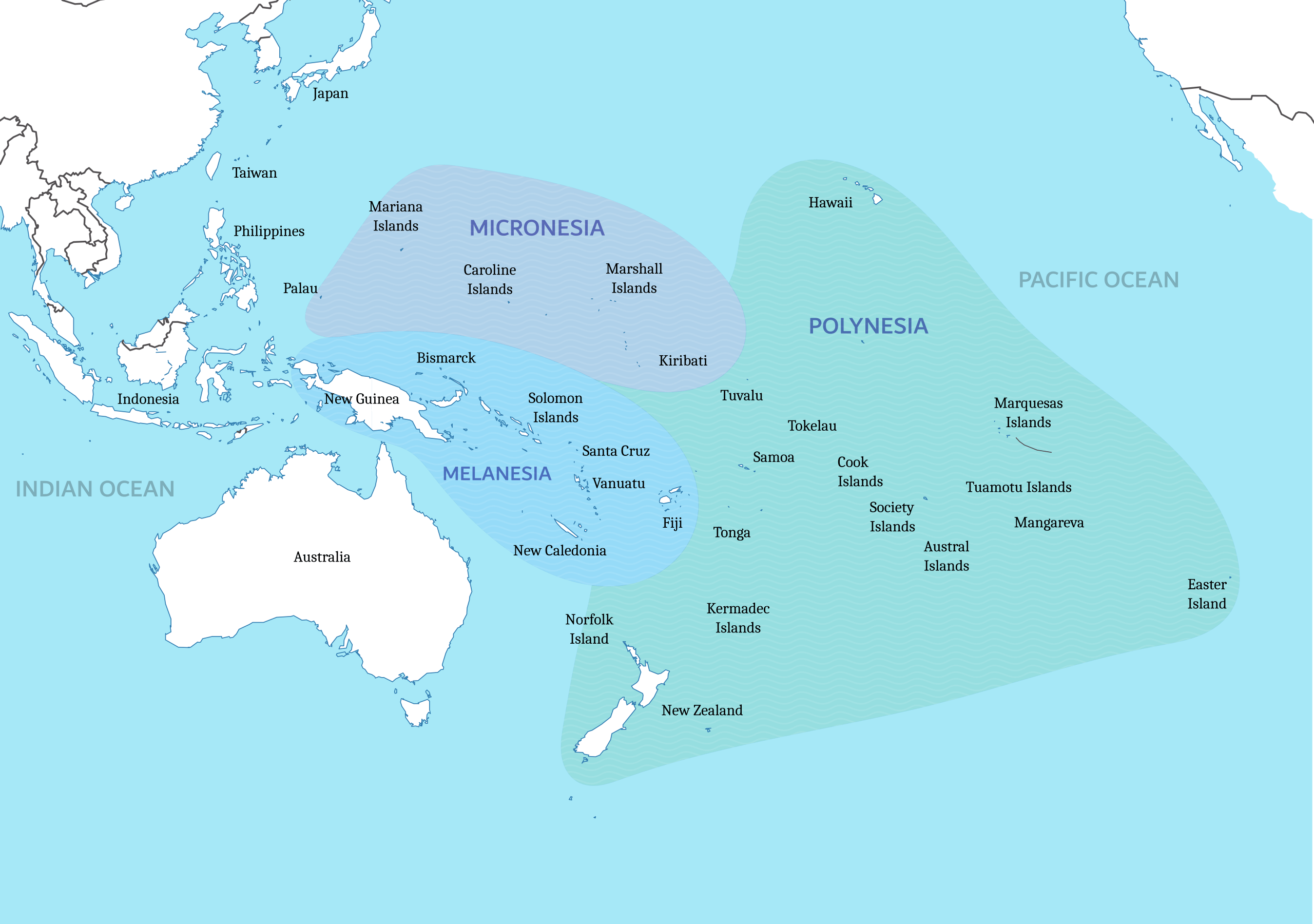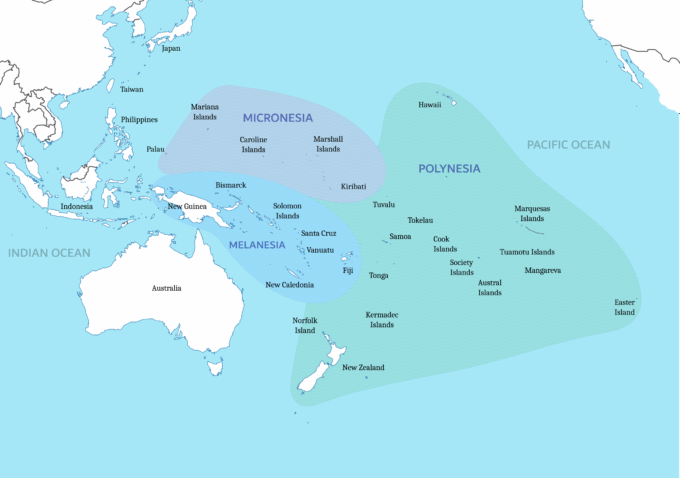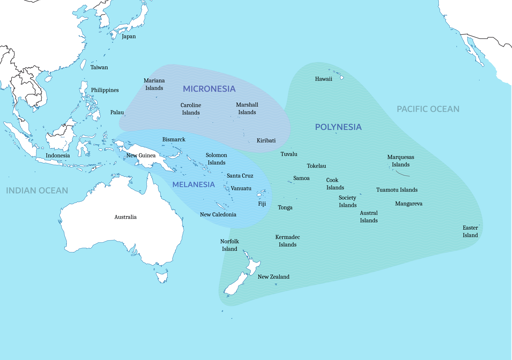

The islands in the Pacific Ocean divided into three major groups. Image Source: Edmund1234 – CC BY-SA 4.0
The leaders of the Pacific Islands are forging a united front against President Donald Trump’s climate denialism and leading the world in the battle against the climate crisis.
After Trump gave an inflammatory speech at the United Nations last month in which he called global warming a “hoax” and dismissed climate change as “the greatest con job ever perpetrated,” the leaders of the Pacific Islands responded by refuting his falsehoods, identifying the existential threats to their homelands, and urging the international community to fulfill its legal obligations to act.
“The climate crisis is not up for debate,” Wesley Simina, president of the Federated States of Micronesia, said in his speech. “The only question now is whether we as leaders will act with the urgency it demands.”
Jeremiah Manele, prime minister of Solomon Islands, urged the world not to be fooled by Trump’s lies. “Contrary to what we heard here a few days ago, the science on climate change is clear and my people are suffering from it,” Manele said.
The Pacific Islands and the Climate Crisis
For decades, the Pacific Islands have been on the frontlines of the climate crisis. From their position in the central Pacific Ocean, they have been facing some of the worst impacts of climate change, including rising sea levels and more destructive storms.
“Climate change remains the greatest existential threat to Samoa and other Pacific Small Island Developing States,” Toelupe Poumulinuku Onesemo, deputy prime minister of Samoa, told the General Assembly.
In 2018, the leaders of the Pacific Islands Forum announced in the Boe Declaration that climate change is “the single greatest threat to the livelihoods, security, and wellbeing of the peoples of the Pacific.”
Although Westerners have long been dismissive of the Pacific Islands, often characterizing them as tiny and insignificant countries, the islands have been critical to many of the world’s most important developments, including World War II, decolonization, and nuclear nonproliferation. Pacific Islanders have long prided themselves as being inhabitants of large ocean states who are responsible for protecting the world’s oceans and environment. They represent multiple nations that range across a vast expanse of the Pacific Ocean.
“Though small in size, our island nations are large in purpose,” Manele said.
Pacific Islanders have exercised some of their greatest influence over the politics of climate change. Not only have they ensured that climate change remains a top priority at the United Nations, but they have played a central role in creating the policies that are guiding the world.
During negotiations over the Paris Agreement, Pacific Islanders helped convince the international community to adopt the goal of limiting global temperature increase to 1.5 degrees Celsius. They rallied behind the slogan “1.5 To Stay Alive.”
The Pacific Islands have been a critical bloc in the Small Island Developing States (SIDS), a group of developing nations that prioritizes the unique risks facing island nations and the need for sustainable development. “SIDS have emerged as global leaders in climate advocacy, championing ambitious commitments and urgent international action,” Shafraz Rasheed, a diplomat from the Maldives, wrote in Foreign Policy in Focus in April.
In recent years, law students from the Pacific Islands have made some of the greatest progress in applying international law to climate change. They initiated the legal battle that resulted in the advisory opinion by the International Court of Justice that countries are legally obligated to address climate change and could face legal consequences if they fail to act. Earlier this month, the students were recognized for their work, winning the Right Livelihood Award.
“I think we stand at this very critical moment within the fight against climate change that we now need everyone to do anything and everything in our power to help keep temperature rise below 1.5,” Vishal Prasad, one of the student leaders, said at a press conference.
The Daily Battle
Although Pacific Islanders have been leading the world in the battle against the climate crisis, they have faced constant obstacles, with some of their greatest challenges now coming from the United States. Not only has the Trump administration withdrawn the United States from the Paris Agreement, but it has been intensifying efforts to sow doubts about climate change and thwart any kind of international response.
During the first day of general debate at the United Nations, President Trump gave a speech filled with lies and misinformation. He spoke against renewable energies, dismissed the science on climate change, and urged countries to invest in fossil fuels. The president repeatedly expressed great pride in his efforts to increase fossil fuel production in the United States.
“You know, we have an expression, ‘drill, baby, drill,’” Trump said. “And that’s what we’re doing.”
Leaders of the Pacific Islands were dismayed but not intimidated. Delivering their own remarks from the same podium where Trump had spoken, they displayed a united front by insisting on the necessity of transitioning away from fossil fuels and working together to save the world.
Australian Prime Minister Anthony Albanese, one of the first island leaders who spoke after Trump, established a baseline for global action by emphasizing the importance of remaining in the Paris Agreement. “We are honoring our commitment to the Paris Agreement and its goal of keeping global temperatures below dangerous levels,” Albanese said.
Over the following days, additional island leaders demanded bolder action. Some called on the world’s richest countries to take the lead in reducing their carbon emissions.
“We call especially on the G20 and industrial nations to cut emissions, reform global finance to support biodiversity nations, and align responsibility with carbon footprints,” James Marape, prime minister of Papua New Guinea, told the General Assembly.
Others shone a spotlight on the fossil fuel industry. They questioned why so many governments continue to subsidize oil companies.
“We continue to reward polluters who wreck our planet,” Sitiveni Rabuka, prime minister of Fiji, said in his statement.
Notably, the leaders of the compact states delivered some of the most impassioned remarks. Despite being subject to numerous U.S. neocolonial controls that limit the sovereignty of their countries, they resoundingly rejected Trump’s position and insisted on the need for action to confront the climate crisis.
Hilda Heine, president of the Marshall Islands, told the world that climate change is endangering her country. She implored the world’s leaders to act.
“My low-lying atoll nation bears witness to the sharpest edge of climate change,” Heine said. “If I could find a louder alarm for the Pacific Islands than my words today, I would sound it.”
Surangel Whipps, Jr., president of Palau, suggested that his country is in a battle for its very survival. He questioned why the world is spending trillions of dollars on war when it needs to be working together to confront the climate crisis.
“Small island states like Palau are also at war,” Whipps said. “Our shores are being invaded by seawater. Our homes are being blown away by storms. Our roads are being washed away by torrential rain. Our reefs are overheating. Our fish are disappearing. And our land is on fire. This is our daily battle.”
New Fronts
In the daily battle against the climate crisis, new fronts are opening.
Some new fronts present major challenges to the Pacific Islands, especially as it concerns the increasingly belligerent bouts of climate denialism erupting from Washington. Many of the highest-level officials are following Trump’s lead in espousing lies and misinformation about climate change.
In the midst of the general debate at the United Nations, Secretary of Energy Chris Wright went so far as to disingenuouslysuggest that the Pacific Islands face little risk from climate change. “They rise and fall with sea level,” he claimed.
While administration officials have isolated and discredited themselves with their falsehoods, Pacific Islanders have remained undeterred, shifting their focus to other fronts. Currently, they are preparing to lead the international community into what may become the next major phase of the world’s response to the climate crisis.
Now that the International Court of Justice has found that countries are legally responsible for addressing climate change, Pacific Islanders are trying to turn the finding into action. Making one of their boldest moves yet, they are working to make the court’s position operational, regardless of the obstructionism of the Trump administration.
“The advisory opinion confirmed what we have always known: 1.5 degrees is not optional,” Surangel Whipps, Jr., president of Palau, said. “It is now the benchmark for global action under international law.”
Odo Tevi, Vanuatu’s representative to the United Nations, agreed, calling the court’s finding a “powerful affirmation of our long-standing call: that climate change is an existential threat, and the world has a legal duty to respond.”
Indeed, Pacific Islanders are forging ahead in the newest front in the battle against the climate crisis. Not backing down from the torrent of lies and misinformation from the Trump administration, they are pushing for action, trying to save their countries and the world from the existential threat of climate change.
“Our ancestors left us a livable planet,” James Marape, prime minister of Papua New Guinea, said. “We must do the same for our descendants.”
This first appeared on FPIF.
The post Countering Trump, Pacific Islanders are Leading on Climate Change appeared first on CounterPunch.org.
From CounterPunch.org via this RSS feed


